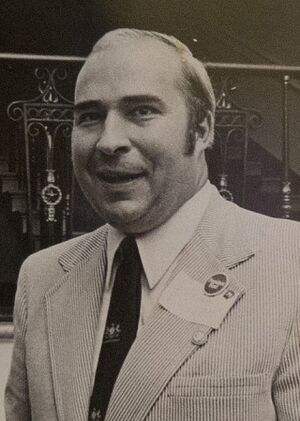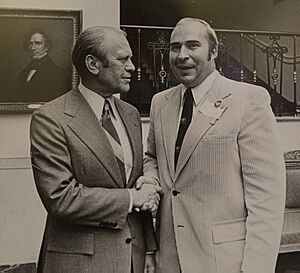R. Budd Dwyer facts for kids
Quick facts for kids
R. Budd Dwyer
|
|
|---|---|

Dwyer c. 1977
|
|
| 70th Treasurer of Pennsylvania | |
| In office January 20, 1981 – January 22, 1987 |
|
| Governor | |
| Preceded by | Robert E. Casey |
| Succeeded by | G. Davis Greene Jr. |
| Member of the Pennsylvania Senate from the 50th district |
|
| In office January 5, 1971 – January 20, 1981 |
|
| Preceded by | James Willard |
| Succeeded by | Roy Wilt |
| Constituency | Parts of Mercer, Crawford, and Erie Counties |
| Member of the Pennsylvania House of Representatives from the 6th district |
|
| In office January 7, 1969 – November 30, 1970 |
|
| Preceded by | District created |
| Succeeded by | Harrison Haskell |
| Constituency | Parts of Crawford County |
| Member of the Pennsylvania House of Representatives from the Crawford County district |
|
| In office January 5, 1965 – November 30, 1968 |
|
| Personal details | |
| Born |
Robert Budd Dwyer
November 21, 1939 St. Charles, Missouri, U.S. |
| Died | January 22, 1987 (aged 47) Harrisburg, Pennsylvania, U.S. |
| Political party | Republican |
| Children | 2 |
| Alma mater | Allegheny College |
| Profession | Politician, teacher |
| Criminal information | |
| Criminal status | Deceased |
| Conviction(s) |
|
|
Date apprehended
|
October 22, 1984 |
Robert Budd Dwyer (November 21, 1939 – January 22, 1987) was an American politician. He was a member of the Republican Party. From 1965 to 1981, he served in the Pennsylvania House of Representatives and the Pennsylvania State Senate. Later, he became the 70th state treasurer of Pennsylvania. He held this position from January 20, 1981, until January 22, 1987.
In the early 1980s, Pennsylvania found that its state workers had paid too much in federal taxes. This happened because of mistakes in how taxes were taken out of their paychecks. A large contract was needed to figure out how much money each employee should get back. In 1986, Dwyer was found guilty of taking a bribe. He was accused of accepting money from a company called Computer Technology Associates (CTA) to give them this contract. He was scheduled to be sentenced on January 23, 1987. On January 22, Dwyer held a news conference in the Pennsylvania State Capitol Building in Harrisburg. He died during this event in front of reporters.
After his death, appeals made by Dwyer's lawyers were not successful. His convictions remained in place.
Contents
Early Life and Education
Budd Dwyer was born on November 21, 1939, in St. Charles, Missouri. He went to Allegheny College in Meadville, Pennsylvania. In 1961, he earned a degree in Political Science and Accounting. He then got a master's degree in education in 1963. After college, he worked as a teacher. He taught social studies and coached football at Cambridge Springs High School.
Political Career
Serving in the Pennsylvania Assembly
Budd Dwyer became very involved in politics as a Republican. In 1964, he was elected to the Pennsylvania House of Representatives. He won reelection in 1966 and 1968. The House of Representatives is where state laws are first proposed and debated.
In 1970, while still a Representative, Dwyer ran for a seat in the Pennsylvania State Senate. The Senate is the other part of the state's lawmaking body. He won the election and became a State Senator in January 1971.
Becoming Pennsylvania Treasurer
After serving two more terms in the State Senate, Dwyer decided to seek a statewide office. In 1980, he ran for and won the position of Pennsylvania Treasurer. The State Treasurer is in charge of managing the state's money. He won reelection for a second term in 1984.
Dwyer believed his work as Treasurer made the department much better. He said it became "one of the most modern in the nation." He also claimed it saved and earned hundreds of millions of dollars each year.
Investigation and Conviction
Before Dwyer became State Treasurer, from 1979 to 1981, state employees in Pennsylvania paid too much in federal taxes. The state needed an accounting company to figure out how to refund this money. On May 10, 1984, Dwyer gave a $4.6 million contract to Computer Technology Associates (CTA). This company was based in California.
In 1984, a deputy comptroller named Dennis Schatzman noticed problems with the CTA contract. He thought it was overpriced by millions of dollars. The Federal Bureau of Investigation (FBI) was told about possible bribery. A former CTA employee also claimed that Dwyer was promised a $300,000 payment (a kickback) to give CTA the contract.
Federal investigators looked into Dwyer's decision to award the contract. Dwyer then canceled the contract with CTA on July 11, 1984. He tried to stop the investigation, saying the U.S. attorney had no right to pursue it. Dwyer later admitted he told his staff not to give certain information to the FBI. He was then charged with agreeing to receive a kickback for the contract.
Dwyer said he offered to take a lie detector test. He wanted all charges dropped if he passed, but the state refused. Other people involved in the case, like John Torquato Jr. (CTA's owner) and William T. Smith (Torquato's attorney), were also charged. Smith later confessed to offering Dwyer a bribe and said Dwyer accepted it.
Dwyer and Bob Asher, who was the Pennsylvania Republican Party Chairman, were charged by a federal grand jury on May 13, 1986. Smith testified against Dwyer and Asher. Evidence at Dwyer's trial showed that he had approved a special law to help recover the tax overpayments. Computer files from CTA also suggested Dwyer was to get a $300,000 payment. Witnesses supported the claims that Dwyer was bribed. FBI agents testified that Dwyer tried to hide his involvement. He even erased a meeting from his calendar after learning about the investigation.
Dwyer said he chose CTA based on his team's advice. However, he personally handled contract matters before giving it to CTA. Also, a larger company, Arthur Young and Associates, had offered to do the work for half the cost. They had more experience than CTA, which was a small company with only three employees.
The Trial and Verdict
Charles Collins from Arthur Young testified that his company could do the tax recovery work faster and for half the price. He said Dwyer knew about Arthur Young's offer. Many other companies also wanted to be considered for the contract. However, Dwyer did not respond to them. Dwyer claimed he chose CTA because they offered "immediate credit," but the contract did not mention this.
Dwyer denied doing anything wrong. He said that after the contract was signed, Smith only made a general offer to help his campaign. Dwyer's lawyer asked the prosecutor if charges would be dropped if Dwyer resigned. The prosecutor refused. He offered Dwyer a deal: plead guilty to one charge, resign, and help the investigation. Dwyer refused this offer and went to trial.
Dwyer did not testify in his own defense. His lawyer believed the government had not proven its case well enough. On December 18, 1986, Dwyer was found guilty on 11 charges. These included conspiracy and mail fraud. He faced a sentence of up to 55 years in prison and a $300,000 fine. His sentencing was set for January 23, 1987. Dwyer said he was "totally innocent of all of these charges."
The accounting company Levin-Horwath eventually completed the contract for $1,300,000. If CTA had done the work, Pennsylvania would have lost $6,000,000.
Pennsylvania law stated that Dwyer could not be removed from office until his sentencing. Dwyer said he would not resign until his legal appeal was finished. He wrote to President Ronald Reagan asking for a pardon. He also asked Senator Arlen Specter for help.
Appeals After His Death
On January 27, 1987, Dwyer's lawyers filed an appeal. They wanted all motions against him to be dismissed. On March 5, 1987, the court denied these requests. The court said there were "no grounds whatsoever" for Dwyer to win an appeal.
Dwyer's lawyers appealed this decision again. A higher court sent the case back, and the district court was told to dismiss Dwyer's motions. His convictions for mail fraud and conspiracy were upheld. Six years after Dwyer's death, in July 1993, efforts were made to clear his name. A request for a new trial was filed but was denied in October of that year.
 | Jackie Robinson |
 | Jack Johnson |
 | Althea Gibson |
 | Arthur Ashe |
 | Muhammad Ali |


